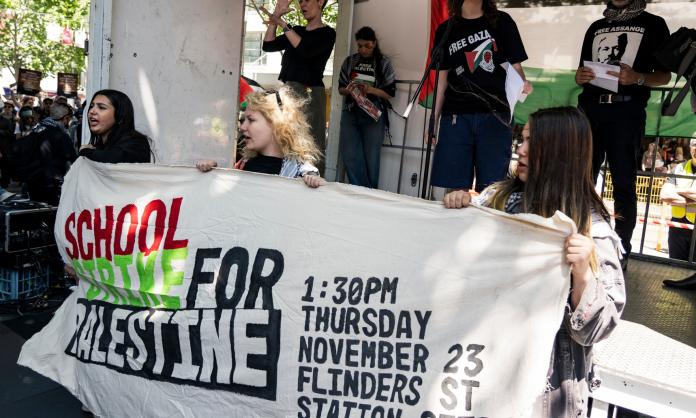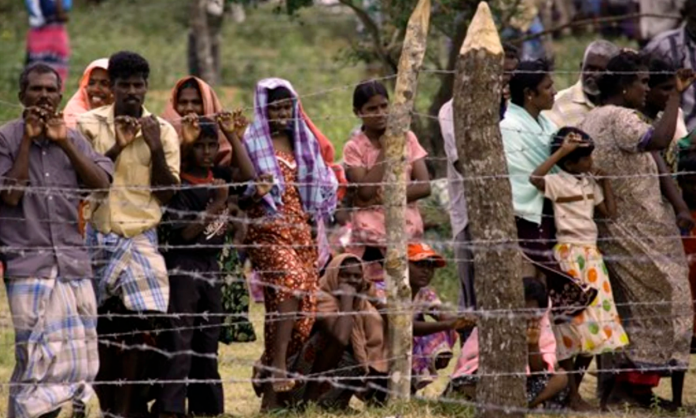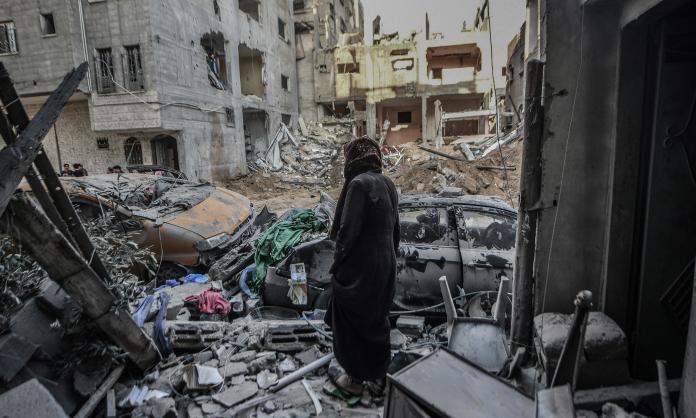“Just because we’re young, it doesn’t mean we can’t have political opinions”, Ramona says. She’s a 14-year-old student at a Melbourne High School and one of the organisers of the school strike for Palestine on Thursday 23 November.
Hundreds of high schoolers are expected to walk out of class and meet on the steps of Flinders Street Station by lunchtime to show solidarity with Gazans facing a genocidal onslaught by the state of Israel. They also want to show their opposition to the Australian government’s support for Israel. For Ivy, another organiser of the walk-out, the sentiment catalysing many of her peers to participate is simple: “We can’t sit back while our government supports genocide”, she says.
“My school friends and I have been going to the Sunday rallies together but we want to do more”, Audra Hope, another student, told the thousands-strong demonstration in Melbourne last Sunday—the sixth consecutive weekend protest in support of Palestine. “We cannot pretend that this isn’t the biggest crime our generation has seen. We cannot be silent as Israel kills kids in cold blood. We cannot accept what our principals are saying: that this is a war with equal sides.”
Ramona, Ivy, Audra and their many peers are following in the footsteps of high school students across the world mobilising against Israeli apartheid and their governments’ complicity in it. From San Francisco to London, high schoolers have ditched class to demonstrate for Palestine. They’ve bellowed chants of “From the river to the sea, Palestine will be free!” across school corridors and scaled monuments to hoist the Palestinian flag.
And just like other high schoolers all over the world, organisers of the Melbourne-based school walk-out are facing a campaign of both condemnation and condescension from their school administrations, establishment media and major political parties.
The right-wing press and the political right are apoplectic. 3AW radio host Neil Mitchell has decried the “manipulation” of high schoolers by supposedly pro-Hamas, professional activists. The Daily Telegraph’s hand-picked child psychologist Michael Carr-Greg has implored parents to prevent their kids from taking part in the walk-out, because “young people’s brains aren’t fully developed yet, [and] it is the job of the parent to be the frontal cortex”.
Meanwhile, federal Shadow Education Minister Sarah Henderson has similarly lamented the use of students as “political pawns” and denounced political activists for importing the “extremely complex conflict in the Middle East into Victorian classrooms”.
As far as the right is concerned, high schoolers and young people more broadly can only ever be instruments, not agents, of politics—particularly when it comes to opinions and actions antagonistic to the pro-Israel status quo.
The message from the Labor Party is similarly dismissive. Victorian Education Minister and Deputy Premier Ben Carrol issued a patronising plea to high schoolers last week: “You want to change the world? Attend school. Get an education”. Federal Education Minister Jason Clare told the Guardian that students, however passionate, “should be at school during school hours”.
In the eyes of the political establishment, high schoolers are simply too young and naive to understand the supposed complexity of Israel’s genocide against Palestinians, and too impotent to make a difference anyway. But high schoolers active in the Palestine solidarity movement beg to differ.
“We know it’s wrong to bomb a hospital filled with kids and babies. We know it’s wrong to force Palestinians out of their homes, only to bomb them on the streets. We know it’s wrong to spin a genocide as self-defence”, Audra says.
For Ivy, the reaction to the walk-out from the political establishment is pure self-interested opportunism. “It’s just a deflection from their complicity”, she says. “If they really cared about students and education, they’d care about the Palestinian kids being bombed in their schools.”
Ramona and her peers are also keenly aware of the ways that high schoolers have fought for social justice historically—not by deferring to authority and diligently doing their homework, but by collectively disrupting the status quo. The struggle against South African apartheid and students’ role in it looms large in their political frame of reference. “High schoolers have walked out before and it’s worked”, Ramona says.
And the more that they are targeted by school administrations, the more their peers are drawing their own conclusions. “There’s been so much repression in my school”, Ramona explains, “and so many of my classmates are shocked and wanting to get active”.
With high schoolers in Sydney, Wollongong and Adelaide now organising to join their Melbourne counterparts in Thursday’s walk-out, young people are leading the way and showing what the “adults in the room” really are: cowardly, compliant apologists for Israeli apartheid.
PHOTO CREDIT: Matt Hrkac







